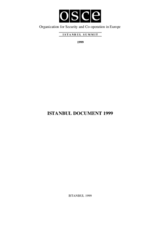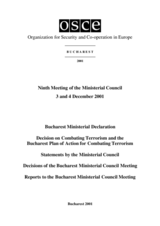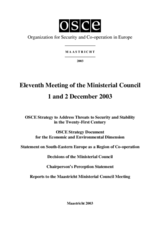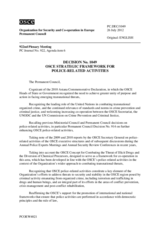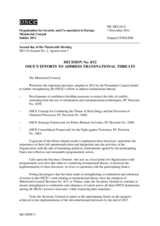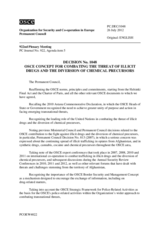-
Our work
-
Fields of work
- Arms control
- Border management
- Combating trafficking in human beings
- Conflict prevention and resolution
- Countering terrorism
- Cyber/ICT Security
- Democratization
- Economic activities
- Education
- Elections
- Environmental activities
- Gender equality
- Good governance
- Human rights
- Media freedom and development
- Migration
- National minority issues
- Policing
- Reform and co-operation in the security sector
- Roma and Sinti
- Rule of law
- Tolerance and non-discrimination
- Youth
- Field operations
- Projects
-
Meetings and conferences
- Summit meetings
- Review Conferences
- Ministerial Council meetings
- Plenary meetings of the Permanent Council
- Plenary Meetings of the Forum for Security Co-operation
- Security Review Conferences
- Annual Implementation Assessment Meetings
- Economic and Environmental Forum
- Economic and Environmental Dimension Implementation Meetings
- Human rights meetings
- Media conferences
- Cyber/ICT security conferences
- Conference of the Alliance against Trafficking in Persons
- Gender equality conferences
- Annual OSCE Mediterranean conferences
- Annual OSCE Asian conferences
- Partnerships
-
Fields of work
-
Countries
- All
-
Participating States
- Albania
- Andorra
- Armenia
- Austria
- Azerbaijan
- Belgium
- Belarus
- Bosnia and Herzegovina
- Bulgaria
- Canada
- Croatia
- Cyprus
- Czechia
- Denmark
- Estonia
- Finland
- France
- Georgia
- Germany
- Greece
- Holy See
- Hungary
- Iceland
- Ireland
- Italy
- Kazakhstan
- Kyrgyzstan
- Latvia
- Liechtenstein
- Lithuania
- Luxembourg
- Malta
- Moldova
- Monaco
- Mongolia
- Montenegro
- The Netherlands
- North Macedonia
- Norway
- Poland
- Portugal
- Romania
- Russian Federation
- San Marino
- Serbia
- Slovakia
- Slovenia
- Spain
- Sweden
- Switzerland – OSCE Chairpersonship 2026
- Tajikistan
- Türkiye
- Turkmenistan
- Ukraine
- United Kingdom
- United States of America
- Uzbekistan
- Asian Partners for Co-operation
- Mediterranean Partners for Co-operation
-
Structures and institutions
- Chairpersonship
-
Secretariat
- Secretary General
- Office of the Secretary General
- Conflict Prevention Centre
- Transnational Threats Department
- Office of the Special Representative and Co-ordinator for Combating Trafficking in Human Beings
- Office of the Co-ordinator of OSCE Economic and Environmental Activities
- Gender Issues Programme
- Opportunities for Youth
- Department of Human Resources
- Department of Management and Finance
- Office of Internal Oversight
- Documentation Centre in Prague
- Institutions
-
Field operations
- Presence in Albania
- Centre in Ashgabat
- Programme Office in Astana
- Programme Office in Bishkek
- Mission to Bosnia and Herzegovina
- Programme Office in Dushanbe
- Mission in Kosovo
- Mission to Moldova
- Mission to Montenegro
- Mission to Serbia
- Mission to Skopje
- Project Co-ordinator in Uzbekistan
- Closed field activities
- Parliamentary Assembly
- Court of Conciliation and Arbitration
- Organizational structure
- About us
Our mandate on policing
Charter for European Security
18 November 1999
The OSCE’s policing activities are based on various individual mandates, action plans and tasks, including several Ministerial Council and Permanent Council decisions taken since 1998. The Charter for European Security, adopted at the Istanbul Summit Meeting in 1999, represents the central platform for the Organization’s involvement in this sphere. The Charter contains the participating States' commitment to enhance the OSCE’s role in civilian police-related activities.
Ninth Meeting Document
Final Document of the Ninth Meeting of the OSCE Ministerial Council, Bucharest
4 December 2001
At the Ninth Ministerial Council in Bucharest in 2001, the participating States decided to increase and promote co-operation among participating States in countering new security challenges, including by providing advice on how to make policing more effective. The States also adopted the Bucharest Plan of Action for Combating Terrorism, which recognized the need for the OSCE to provide assistance, upon request, in the areas of fighting trafficking in human beings, illicit drugs and small arms and light weapons, including through police-related advisory and capacity-building support.
Eleventh Meeting Document
Final Document of the Eleventh Meeting of the OSCE Ministerial Council, Maastricht
2 December 2003
In 2003, at the 11th Ministerial Council in Maastricht, the participating States adopted the OSCE Strategy to Address Threats to Security and Stability in the Twenty-First Century. The document reinforces the OSCE’s intent, again upon request, “to increase its focus on assistance to authorities, including at the local level, on fighting crime and criminal networks” and “to define and develop core competencies for police activities such as training and capacity-building activities”.
Decision No. 5/06
Decision No. 5/06 on the organized crime
6 December 2006
Three years later, the participating States reaffirmed its focus on organized crime, by adopting a decision on this issue at the 14th Ministerial Council in Brussels in 2006. This follow-up Decision on Organized Crime included provisions on enhancing attention to the key role of criminal justice systems in institution-building and in the promotion of the rule of law. Another major task spelled out by the Decision was to
build on and consolidate the knowledge and experience on criminal justice and organized crime, and to continue co-operating with the United Nations Office on Drugs and Crime on questions of organized crime and illicit drug trafficking.
Permanent Council Decision No. 1049
Permanent Council Decision No. 1049: OSCE Strategic Framework for Police-Related Activities
26 July 2012
The Strategic Framework for Police-Related Activities, adopted by the Permanent Council in 2012, defines the OSCE’s goals and priorities in the area of police-related activities. It details that the Organization shall assist the authorities of the participating States—at their request—to develop and reform their police services and address threats posed by criminal activity, as well as advise and assist them in the planning and implementation of police reform programmes. The Framework deals with a broad array of police-related issues, such as police development and reform and the fight against organized transnational crime, including trafficking in illicit drugs and precursors, trafficking in human beings, the sexual exploitation of children on the internet, and cybercrime.
Decision No. 4/12
Decision No. 4/12 on the OSCE's efforts to address transnational threats
7 December 2012
Later in 2012, at the Ministerial Council meeting in Dublin, the States adopted a decision on the OSCE’s Efforts to Address Transnational Threats, which endorsed four Permanent Council decisions from 2012, among them the aforementioned Strategic Framework for Police-Related Activities and the Concept for Combating the Threat of Illicit Drugs and the Diversion of Chemical Precursors. With the adoption of these decisions, the participating States reaffirmed the key role that the OSCE’s police-related activities play in its efforts to address threats to security and stability posed by criminal activity.
